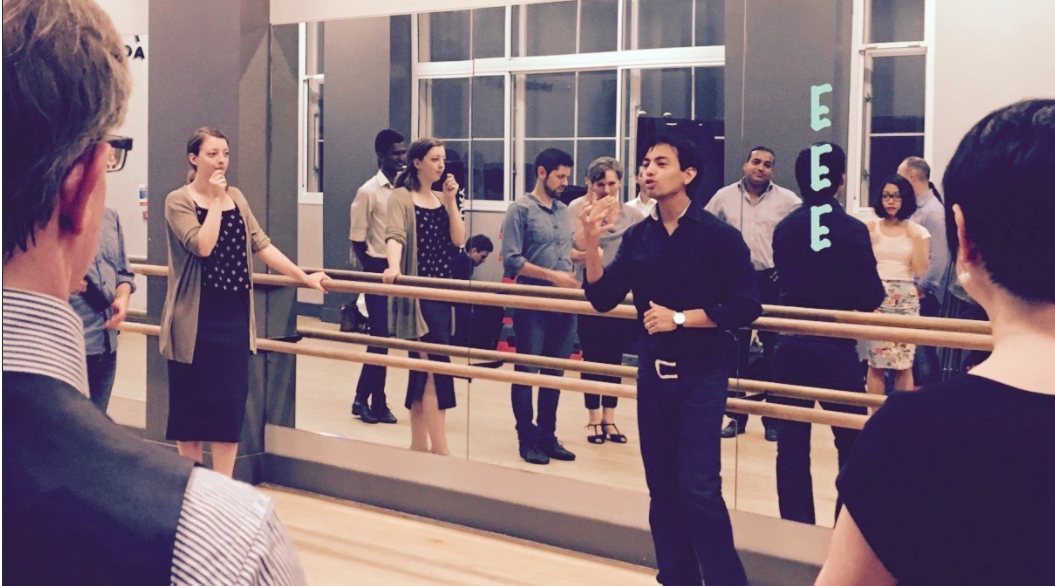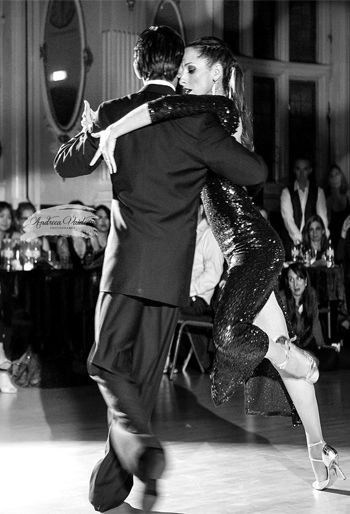As a tango teacher, I often get a little window into my students’ tango experiences.
They tell me how they get on at the milonga, the comments they receive, the dances they had. I hear about their highs – when everything just seems to work, to fly – and I also hear about their lows. The the days when nothing seems to work. How do we conquer these frustrations?
Well, one thing’s for sure, we all have “those days”. The days when our legs turn to lead, our core to jelly and our confidence plummets to new lows. I can assure you that even those people who you would swear never have a bad day – the ones that seem to pick everything up straight away, that everyone wants to dance with – also have “those days”. I know because they come up to me at the end of class and tell me!
So as a teacher and as dancer who has had her own fair share of frustrations, here are my 10 tips for getting through the tango blues:
1) Frustration Motivates
A lot of the students who are the most hard on themselves, actually end up becoming better dancers for it.
When you get frustrated, however unpleasant it can be, it gets you motivated. True, frustration can block progress if it gets out of hand. And it certainly isn’t a good thing if it takes over your enjoyment of tango.
But if you’re frustrated it means that you care deeply about getting better, and this in turn helps you focus, work harder and achieve more. So tell yourself that next time you feel frustrated!
2) We’re Humans not Robots
To expect yourself to perform exactly the same every day, is to place unrealistic standards on yourself (which in turn leads to more frustration).
We’re human beings, not robots. Every day when we wake up, we feel slightly different. Sometimes we wake up with a spring in our step, sometimes we feel down. Sometimes our muscles just seem to be tighter for no reason or our patience short. It’s just the way things work. So why would dancing be any different? In fact dancing is an activity that encompasses the mind, the body and the soul – how can we expect the interaction between these elements to be the same every day?
And when comparing humans and robots, I know who I would prefer to dance with.
3) Passion v. Patience
When you’re passionate about something, it often means you want to learn it really quickly – you want to dance tango and you want it NOW – and this can lead to frustration. Passion and patience are not easy bedfellows.
So there you have it, you’re frustrated because you’re a passionate person. And if you want to dance tango, being passionate is a GOOD thing!
4) Enjoy the Journey
It sounds like a cliche but it’s important so, sorry, I have to say it!
When you learn tango, you’re very much on a journey of discovery. And that journey actually does not have an end. The more deeply you study tango, you more you discover there is to learn. It is an exciting and satisfying process, so why would you want it to stop?
Focus on your journey, not on your perceived end goals (they will continually shift anyway).
5) Talent is Just Practice
Was there someone at your school who never seemed to have to work and just sailed through with high marks? There was always one wasn’t there? But that’s just it, there was usually just ONE.
The majority of us need to work at something to get good at it. When you see someone dancing beautifully and effortlessly on the dance floor, you don’t see all the hours of time they’ve put into achieving that, the practice in front of the mirror at home, the classes attended, the videos watched and yes, most probably, the self-doubt.
You don’t see the blood, sweat and tears – you just see the final product.
One famous golfer was quoted as saying: “the harder I work, the luckier I get”.
6) Every Dancer Has Limitations
Even in the professional world of dance, it is very rare to find a dancer who has everything: the flexibility, the strength, the stamina, the co-ordination, the artistic expression.
Everyone has their own individual limitations as a dancer. But everyone has something unique to offer. The sooner you accept and embrace your limitations as a dancer, the sooner you’ll allow yourself to become the dancer you can be.
I’ve always found this quote from Martha Graham inspirational:
“There is a vitality, a life force, an energy, a quickening that is translated through you into action, and because there is only one of you in all of time, this expression is unique. And if you block it, it will never exist through any other medium and it will be lost.”
7) Who Says You Should be Able to Do It?
What actually is going on in our head when we get frustrated? If we get to the crux of the matter, it is usually a little voice that’s saying: “Why can’t you keep your balance …” “why can’t you remember to do such and such …” – a little voice that is saying “You should be able to do this by now!”
The trouble is we don’t often question that voice. Who says I should be able to do it NOW? Who set this arbitrary time frame? Perhaps that voice is putting unreasonable demands on you?
Give yourself and your body the time you deserve to learn a new skill. All things in life that are worthwhile take time and dedication.
8) The Plateau Illusion
Sometimes the fact that you feel you have reached a plateau – or even have made backward progress – can be a sign that in fact you are making progress. It is a sign that you are now more aware of what you need to improve. This is the first step in the process of correcting something.
There is a recognised four-stage process to learning any new skill:
Unconscious Incompetence
Conscious Incompetence
Conscious Competence
Unconscious Competence.
Feeling “consciously incompetent” is not a particularly enjoyable experience, but it is the first and necessary step in mastering your skill.
Remember also the learning progress is so gradual that you don’t always feel or see it happening. I like to think of it like a plant growing. You might not see it growing but by the end of some weeks or months, there’s a definite change.
9) Let It Go
On the days that things don’t work, it seems that the more we try the worse it gets. So stop trying too hard. Breathe, close your eyes (if you’re a follower!), let the music sweep through you and ENJOY. Don’t demand too much of yourself … you’re having a bad day!
Again, I love this Martha Graham quote:
“It is not your business to determine how good [your dancing] is nor how valuable nor how it compares with other expressions. It is your business to keep it yours clearly and directly, to keep the channel open. You do not even have to believe in yourself or your work. You have to keep yourself open and aware to the urges that motivate you. Keep the channel open. … No artist is pleased. [There is] no satisfaction whatever at any time. There is only a queer divine dissatisfaction, a blessed unrest that keeps us marching and makes us more alive than the others.”
Everything is transitional. If you accept its not your day, things might just start to flow a little more.
10) Look Forward To Your Next Good Day
I always think that if you’ve had a bad day or even a few bad days, you’re due a good day soon. And when that good day comes it feels incredible, all the more so because you finally feel liberated from the frustration.
Savour the good days, you’ve earned them and they’re worth it!







